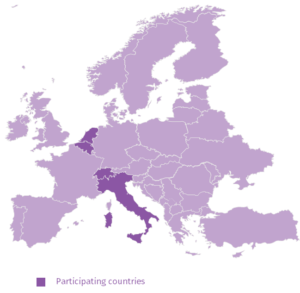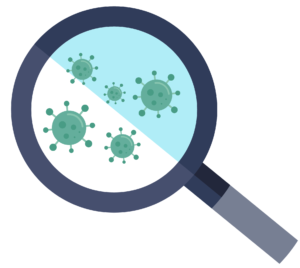Epidemiological Studies and Modelling
The overall objectives of the epidemiological studies and modelling are to:
- Estimate key transmission characteristics of SARS-CoV-2 in Europe from detailed data documenting the transmission of SARS-CoV-2 to contacts of confirmed cases;
- Integrate these estimates into mathematical models that can simulate the spread of SARS-CoV-2 in the population under different control scenarios – so that the impact of the different control strategies can be evaluated;
- Develop tools for nowcasting and forecasting;
- Investigate the long-term implications of this emergence for public health.

Epidemiological Studies and Modelling Team
The epidemiological studies and modelling are divided into two different study parts:
Household study
Transmission, epidemic dynamics and modelling
Household study
This is a crucial study as the spread of infection within households is one of the main factors that drives the pandemic of SARS-CoV-2. It will be carried out with household members living with a person who is confirmed to be ill in order to better understand how the virus spreads.

- All participating households will take part in the study through the COVapp. This is a custom-made interactive app that will guide participants on study activities, such as recording their symptoms on a daily basis;
- Household members will also be asked to collect swabs on the 1st or 2nd day when they show the first respiratory symptoms;
- Samples will be screened for SARS-CoV-2 and other respiratory viruses in the study laboratory. Blood will also be collected to test for antibodies against the novel Coronavirus among the households;
- The study team will also interview household members to better understand how they are coping and how they are managing to implement recommendations that aim to prevent spread of infection within the home.
Transmission, Epidemic Dynamics and Modelling
Decision makers and planners managing the response to the SARS-CoV-2 pandemic need to be supported by sound assessments of risks, detailed evaluations of the likely impact of the control strategies they could implement, and pandemic nowcasting and forecasting. RECOVER will therefore provide a range of data and analytical results to guide the public health response. 
- European policy makers need to determine which combination of control measures they plan to use in their countries;
- It is essential to build a detailed understanding of the key transmission parameters of SARS-CoV-2 and to ascertain transmission risk factors;
- Such understanding is also important to determine which contacts of a case should be prioritized for contact tracing in a context where follow-up of all contacts may quickly become impossible.





